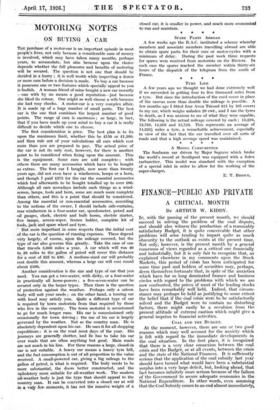FINANCE-PUBLIC AND PRIVATE
IF, with the passing of the present month, we should succeed in solving the problem of the coal dispute, and should also witness the production of a reasonably satisfactoiy Budget,' it is quite conceivable that other problems will arise tending to impart quite as much obscurity to the outlo-ok as exists at the present time. Not only, however, is the present month by a general consensus of views regarded as a critical one financially and industrially, but it is only fair to recognize that, as explained elsewhere in my comments upon the Stock Markets, this period of crisis has been anticipated for some time past and holders of securities may, perhaps, deem themselves fortunate that, in spite of the anxieties which have for so long dominated finance and business circles with regard to the problerns with which we are now confronted, the prices of most of the leading stocks have been remarkably well- !Weed, that circum- stance may perhaps be held, as justifying to some extent the belief that if the coal: crisis' were to be satisfactorily solved and the Budget- were td'Contain no disturbing factors, there might easily be a revulsion from the present attitude of extreme caution which might give a general impetus to financial activities.
COAL AND THE BUDGET.
At the moment, however, there are one or two good reasons which may well account for,the anxiety which is felt with regard to the immediate developments in the coal situation. In the first place, it is recognized that there is a very clear connexion between the coal crisis and the Budget, or at all events, between the crisis and the state of the National Finances. It is sufficiently serious that the application of the coal subsidy last year should have turned what would have been a substantial surplus into a very large deficit, but, looking ahead, that fact becomes infinitely more serious because of the failure of the Government to secure adequate economies in the National Expenditure. In other words, even assuming that the Coal Subsidy comes to an end almost immediately, the new.Supply Expenditure is still likely to be greater than in the year which has passed, while any material extension of the Subsidy would involve the prospect of a fresh deficit, to say nothing of the injury which would be inflicted upon the National Credit as a whole. If the Government had so economized as to achieve a great surplus, there might perhaps be the less anxiety, at all events- from the standpoint of the National Finances. As it is, however, it becomes absolutely vital that the Coal Subsidy should never be renewed.
FORRIGN COMPETITION.
And if this is true as regards the National Accounts, what must be said with regard to the state of trade as a whole ? Applying the same line of argument, it might be said that if we were enjoying a large visible trade balance in our favour, the prospect of industrial unrest might not be a point of such keen concern. When, however, it is remembered that, apart from the War period, the adverse trade balance of last year was the highest in our history; and when it is also borne in mind that we are now shouldering the full responsibilities of a gold standard and a free gold market, it should be unnecessary to labour the urgent need for a trade revival. And, once again pursuing the same line of argument, it might be said that there would be less ground for anxiety with regard to the coal crisis and the industrial situation generally if there were a prospect of foreign competition being less -severe. Nothing, however, is clearer than the likelihood of such competition increasing rather than diminishing. I have talked recently with several reliable business men who have recently returned from Germany, and one and all testify to the spirit of industry prevailing in that country, and the readiness on the part of the workers to adapt their conduct to the needs of the situation. Up to the present, Germany's power to compete has been restricted by lack of capital, but there are signs that that difficulty is being rapidly overcome, in which case it will not be long before we are up against what is undoubtedly the fundamental point, namely, the relative ability and willingness on the part of the respective communities in Germany and England to shape their standards and conduct of life in accordance with. the economic requirements forced upon both -countries by the effect of the Great War.
Tnx USES OF ADVERSITY.
I think there can be little doubt that those who will be concerned in determining the settlement of 'the present coal crisis, namely, the Government, the Coalowners and .the Miners, must all be perfectly conscious of the stern facts with which the country is faced. Any attempt to minimize them will, I venture to think, hinder rather than help a solution of the crisis. If, on the other hand, they are not only courageously faced but are used as an inspiration to effort, it may be possible to look back upon the period through which we are now passing as one of crisis, but also as one marking the turning point in the direction of more favourable conditions.



























































 Previous page
Previous page